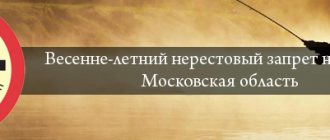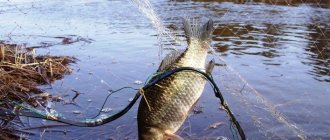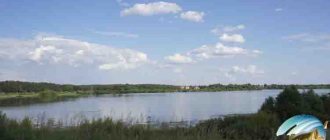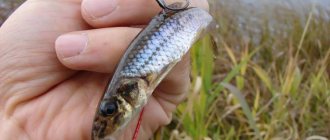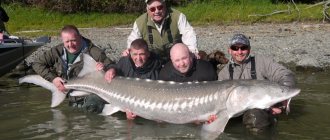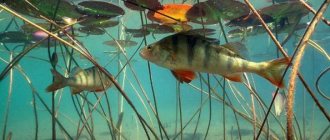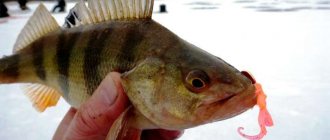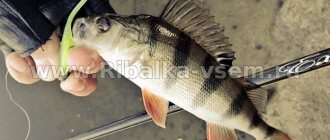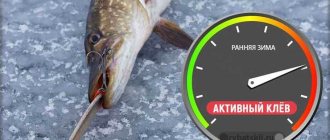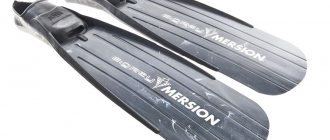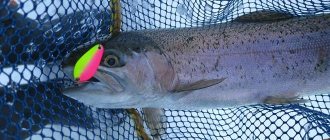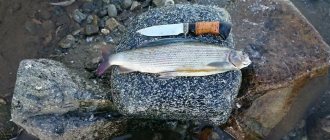Citizens who are interested in fishing have probably heard that on January 1, a new law on fishing comes into force in 2021 (the text of this document is available for download at the end of the article). Its full name is Federal Law No. 475-FZ of December 25, 2018 “On recreational fishing and on amendments to certain legislative acts of the Russian Federation.”
Although the regulation was adopted at the end of 2021, most of its provisions have only come into force now. Read more about what rules the new fishing law introduces from January 1, 2021, and what restrictions are set for free fishing.
Legal assistance:
Free in Russia: 8
Dear readers!
The free legal assistance hotline is available for you 24 hours a day!
Recreational fishing restrictions
You can read about the list of permitted and prohibited methods of amateur fishing in this article. Here we will look at those bans that came into force in 2021.
- Fishing with nets is now prohibited for all regions except the North, Siberia and the Far East. For these regions, certain periods have been established during which net fishing can be carried out for personal consumption;
- Any fishing using electricity, chemicals or explosives is prohibited;
- Underwater hunting is prohibited in places of public recreation, using electronic detection devices, using scuba gear or similar self-contained breathing devices, and it is also prohibited to hunt while above the surface of the water.
General provisions
After the publication of the text of 475-FZ, contradictory information appeared in the information space, sometimes misleading citizens. In particular, the message that the federal law on recreational fishing in 2021 approves new fishing rules is untrue.
“Fishing Rules” is a separate legal document. In accordance with Art. 8 of the new Federal Law-475, they contain specific principles for fishing. According to part 2 of Art. 43.1 of the Federal Law of December 20, 2004 No. 166-FZ “On Fisheries and the Conservation of Aquatic Biological Resources”, Fishery Rules as a regulatory document are approved by the executive authorities in the field of fisheries for each association of water bodies specifically approved by law and called fishery basins (Azov, Volga-Caspian, Baikal, etc.).
In this regard, FZ-475 does not introduce new rules for recreational fishing; it, first of all, identifies the area of recreational fishing as a separate area of regulation and establishes some of its own principles for it. At the same time, the “old” law FZ-166 “On Fisheries...” of 2004 continues to be in force, albeit in a new edition, with amendments approved by law 475-FZ.
Amendments to Law No. 166-FZ “On Fisheries...” were made in order to uniformly apply the legislation.
New law on extending the dacha amnesty until 2022 – when can we expect adoption?
Features of sporting events
Before holding any cultural and sports event, it is necessary to notify the federal executive body that carries out the functions of providing government services in the field of fisheries, that is, the local branch of the Federal Fisheries Agency.
The notification of official physical education and sporting events must contain the following information:
- Place and timing of official physical education and sports events;
- Name, address and location (place of residence) of the organizers of official physical education events and sports events;
- Planned number of participants in official physical education and sporting events;
- Information on the inclusion of official physical education events and sports events in the Unified calendar plan of interregional, all-Russian and international physical education events and sports events or calendar plans of physical education events and sports events of the constituent entities of the Russian Federation, municipalities.
general information
The following features of 475-FZ can be highlighted:
- The new law makes changes to some already existing acts (for example, the Water Code, Federal Law-166).
- The full text includes 19 articles, that is, the document is small. It contains both declarative and referential norms, as well as very specific rules.
- Almost all articles of 475-FZ came into force on January 1, 2020.
- Only paragraph 8 of Art. 16 came into effect on January 1, 2021 (on the closure of all fishing grounds for recreational fishing, except for some special zones in the Far East, Siberia and the North, by December 31, 2021).
Fishing enthusiasts especially actively protested against the existence of such sites and the expansion of rights of tenants. Outrage was caused by the actions of tenants of water bodies to introduce special permits for fishing and the extraction of aquatic biological resources, which actually made fishing paid. However, their actions were based on the law, since in 2011, amendments to Federal Law-166 “On Fisheries...” owners of fishing grounds received the right to enter into agreements not only for the paid provision of tourist services, but also to conclude agreements for the “provision of paid services in the field of recreational and sport fishing."
Responsibility
In Art. 14 FZ-475 states that administrative and criminal liability is established for violation of the legislation on recreational fishing. The Fisheries Law in 2021 does not introduce fines for violators; they are specified in Art. 8.17, 8.37 Code of Administrative Offenses of the Russian Federation, Art. 256 of the Criminal Code of the Russian Federation. Administrative fines for individuals reach 5,000 rubles, criminal fines - 500,000 rubles.
An additional punishment to administrative liability may be confiscation of the vessel and fishing gear.
Alternative penalties to a criminal fine are:
- a fine in the amount of salary/other income for 2-3 years;
- compulsory work up to 480 hours;
- repair work up to 2 years;
- imprisonment for up to 2 years.
When illegal fishing is recognized as a crime, and it was committed by a group of persons in conspiracy and caused particularly large damage, then the fine can reach 1,000,000 rubles, and imprisonment - 5 years.
The Government has assessed the increase in the retirement age to 70 years - should we expect a new law?
Fishing rules and spawning ban in 2021 by regions of Russia
This year, a second package of amendments to the law came into force, establishing restrictions in this area of business. The addition is intended to make a distinction between amateur and industrial mining. The amendments regulate the accessibility of reservoirs, prohibit nets and some other methods of extraction, and also establish the procedure for holding sports events.
The law introduces the term “recreational fishing.” It is the harvesting of biological resources by individuals to satisfy food needs. In addition, the holding of registered sporting events falls under this category. The law also establishes a “daily norm” - the volume of production not included in the Red Book, the excess of which is punishable by a fine.
The catch, which does not exceed the quota, in accordance with civil law, belongs to the fisherman. The law establishes that all internal waters of the Russian Federation can be used for fishing.
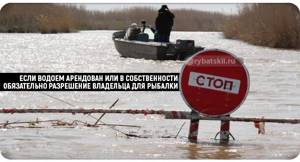
However, the legal act has some restrictions:
- Fishermen will not be allowed into water bodies located on defense lands or specially protected natural areas.
- Access without the owner's permission may be limited to a personal or rented body of water used by a private or legal entity.
- It is prohibited to fish in facilities used for pond aquaculture, quarries, technical watercourses and canals used in the operation of reclamation systems.
- Facilities for commercial fish farming are also inaccessible to the hobbyist.
Daily quotas are not taken into account during sporting events and when applying the catch-and-release principle.
Restrictions during spawning are introduced so that sexually mature individuals can safely give birth to offspring. The timing of the cessation of production depends on the region of location. Thus, in the Sverdlovsk region, the rules establish a ban from April 25 to June 15 on most reservoirs. For some, these frames are from May 1 to May 30. In the Astrakhan region, restrictions apply from May 16 to June 20. In addition, crayfish fishing is prohibited in the region from April 1 to June 30.
Restrictions for the Novgorod region are of a differential nature. From April 5 to June 1 in the floodplain of Lake Ilmen between the rivers Lovat, Vergot, Raplya and in the river. The niche from the mouth to the village of Bronnitsa, including tributaries, fishing is prohibited. From July 1 to September 15 you cannot fish in Snetka, and from November 1 until the ice melts - in wintering pits.
In the Lipetsk region, spring restrictions apply from April 20 to June 1. The Don River with all its tributaries, branches, channels and hollow lakes in the area above the mouth of the Ilovlya River is prohibited. Winter "holidays" begin on November 15 and end on March 31. During this period, you cannot fish in wintering pits or carry out spearfishing.
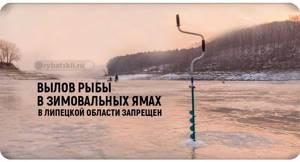
The Nizhny Novgorod region has an extensive network of water bodies, which causes some difficulties in establishing the timing of the spawning ban. Fishermen should focus on early April and mid-June. In addition, winter fishing enthusiasts should refrain from fishing from December 20 to March 15 in some sections of the Sura, Ognevka, Medyana, Urga and Piana rivers.
In the Chelyabinsk region, fishing on the Techa River with all its tributaries and floodplain objects is prohibited year-round. Calendar restrictions begin on April 25 and end on June 5 in the Trinity and South Ural reservoirs, as well as Lake Ulagach. On other reservoirs, the restriction lasts from April 25 to June 5.
The law establishes restrictions on fishing of biological resources for all subjects of the Russian Federation. To accurately determine the prohibited periods for a particular reservoir, you need to familiarize yourself with the relevant section of the legal document.
Catch rates
The law regulates the maximum permissible mass of prey. For members of the Society of Hunters and Fishers it is 5 kg, for all others - 3 kg. This is the daily norm, but if your stay on the reservoir takes more than 24 hours, it is allowed to exceed the norm twice. A list of prohibited species has been compiled for each fishery.
Additionally, the following characteristics are taken into account:
- the minimum permissible size is regulated for each type of fish;
- weight.
If these parameters are less than acceptable, the prey should be released into its habitat with minimal damage. Most often, these standards are indicated in the fishing permit or in the permit for spearfishing. As an example, it is recommended to familiarize yourself with the data in the table, which shows the permitted fish species.
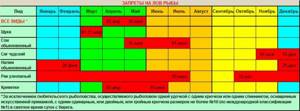
To measure the length of crustaceans, take the distance from the eyes to the end of the tail plates. This applies to crayfish; amateur crab fishing in Russia is prohibited.
Tuning a PVC inflatable boat for fishing with your own hands - options and practical tips
What rights do fishermen have now?
Starting this year, amateur fishermen received the following rights, which we recommend actively using:
- Ownership of fish, now all attempts to carry out any illegal actions with your catch by unauthorized persons fall under the scope of the Civil Code and the Criminal Code of the Russian Federation.
- Receive from government authorities information about the state of aquatic biological resources and their habitat, water bodies where recreational fishing is carried out , regulatory legal acts governing relations in the field of recreational fishing, and other information, unless otherwise established by the legislation of the Russian Federation;
- Participate in the implementation of public control in the field of recreational fishing, including in the form of public discussion;
- Participate in activities to preserve aquatic biological resources and their habitats.
- Fish in fishing grounds if you have a permit;
- You can fish on a catch-and-release basis.
We recommend: How to choose a travel mat
Fishing times and prohibited gear
In most cases, fishing during spawning is prohibited. Each region sets certain dates, most often these are spring and winter. Special restrictions apply to spearfishing - the fishing ban lasts longer than traditional fishing methods.
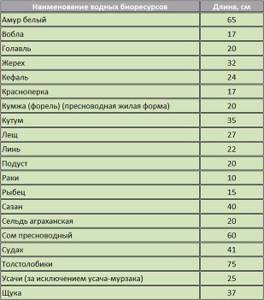
However, there are exceptions - you can plan fishing without a catch limit in certain places. These include thermal power plant channels, lock chambers, in areas located at a distance of up to 500 m from the dams. A large amount of potential production accumulates in these places. You can fish there during the ban, but in some cases a fishing ticket is required.
For recreational fishing, gear restrictions apply:
- Any form of net fishing is prohibited;
- use of special traps, with the exception of crayfish traps;
- fishing for rubber in those rivers and reservoirs where salmon are found;
- you need to know how many hooks are allowed - up to 10 pcs. on the rails for 1 person;
- bottom seines and trawls of all designs;
- fishing devices using hooks;
- scoops or lifts, whose dimensions exceed 1*1 m, and the cell pitch is more than 10 mm;
- traps;
- piercing objects - spears, harpoons.
Spearfishing is regulated separately. In some cases, it is prohibited to use a light source when fishing at night. A special fishing ticket is also required. He is prescribed for hunting in a specific body of water. The requirements for underwater hunting are stricter than for classic fishing. How to choose a good spinning rod for beginners - tips and videos

Illegal fishing methods
There is a general ban on certain fishing methods. The defining feature is a violation of the local ecological system, a large one-time volume of production. In addition to the fact that you cannot fish in the spring and during the spawning period, you cannot use the described methods.
These include the following:
- the use of hooks and lights for spearfishing;
- jamming using explosives, electrical devices;
- trolling on a boat with a sail or motor with more than two baits;
- organization of dams;
- fish using girders (circles) if the number of hooks exceeds 10 pcs. per fisherman;
- catching fish using the method of lowering a reservoir;
- installation of structures such as huts on ice;
- Fishing from a boat is not allowed during spawning;
- There is a ban on fishing using firearms or pneumatic weapons.
To fish from a boat, you must register your craft. You also need to issue a fishing ticket for fishing using special methods, in particular spearfishing.

Is it possible to use networks under the new legislation?
The general rule regarding networks according to Law No. 475-FZ is a ban on their use. Exceptions are made for certain regions. Let's take a closer look.
According to Part 2 of Art. 9 of Law No. 475-FZ, networks can be used in the North, Siberia and the Far East, subject to a number of conditions, namely:
- networks are used by citizens;
- the purpose of the catch is personal consumption;
- Before use, the network must undergo an accounting procedure and be labeled.
Important! Accounting issues are dealt with by territorial executive authorities (Part 3, Article 9 of Law No. 475-FZ). Currently these are the bodies of Rosrybolovstvo.
Network marking in accordance with Part 4 of Art. 9 of Law No. 475-FZ must contain:
- owner information;
- characteristics of this mining tool;
- registration number.
Note! Law No. 475-FZ specifically states a ban on the circulation of gill nets. The specifics of their use in the Far Eastern, Siberian and northern territories are established by the Government of the Russian Federation.
Risks! Responsibility for violation of fishing rules is determined by Part 2 of Art. 8.17 (for fishing in violation of the rules in sea waters), part 2 of Art. 8.37 (for fishing in violation of the rules on other water bodies) of the Code of the Russian Federation on Administrative Offences.
Part 6 art. 9 of Law No. 475-FZ prohibits the use of nets in fish breeding areas.
According to paragraph 5 of Art. 2 of the Law “On Aquaculture (Fish Farming)…” dated July 2, 2013 No. 148-FZ, a fish breeding area is a water body or part thereof used for fish farming (including on the continental shelf or in the exclusive economic zone of the Russian Federation).
